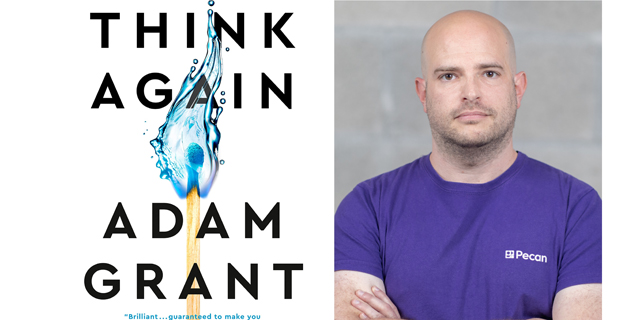
BiblioTech
CTech's Book Review: Let’s change the way we think
Noam Brezis, Co-founder and CTO at Pecan AI, shares insights after reading “Think Again: The Power of Knowing What You Don't Know” by Adam Grant
Noam Brezis | 10:47, 19.01.22
Noam Brezis is the Co-founder and CTO at Pecan AI, a predictive analytics platform. He has joined CTech to share a review of “Think Again: The Power of Knowing What You Don't Know” by Adam Grant.
Title: “Think Again: The Power of Knowing What You Don't Know”
Author: Adam Grant
Format: Book
Where: Home
Summary: Being able to think well is important, but Adam Grant’s book “Think Again: The Power of Knowing What You Don’t Know” highlights maybe even more important skills: rethinking and unlearning. Everyone has habitual patterns of thinking, conditioned responses, and identities based on what they think they know. But in a quickly changing world, personal happiness and business success can depend on a willingness to re-evaluate even long-held beliefs. Grant, an organizational psychologist at the Wharton School of the University of Pennsylvania, draws on numerous research studies to show why it’s important to actively challenge your existing ideas and beliefs. He also suggests ways you can challenge your own and others’ ideas productively. As Grant puts it: “Thinking again can help you generate new solutions to old problems and revisit old solutions to new problems. It’s a path to learning more from the people around you and living with fewer regrets.” Important Themes: - Think like a scientist for success. This theme resonated with my personal interests in science, data, and AI. Grant advocates for operating in “scientist mode”: actively searching for truth by running experiments that test our hypotheses about the world. One interesting study Grant cites is about a project that trained startup founders in scientific decision-making. The founders were encouraged to think about each decision as a hypothesis that could be tested. A control group of startups whose founders didn’t receive the training generated an average of $300 in revenue over the following year, while the companies of the founders who received the training produced $12,000. The trained founders made adjustments more quickly and flexibly based on data about their first efforts. They rethought their ideas and adapted. - Seek out people who challenge your thinking. Grant points out that as leaders rise, they may, like politicians, select supporters as their closest allies: “As they gain power, they tune out boat-rockers and listen to bootlickers.” But people who challenge your thinking will strengthen your decision-making and generate greater innovation. Grant recommends building a “challenge network” of trustworthy people who will speak up when they feel you should rethink things. - “Confident humility” supports innovation and learning. Grant describes the “sweet spot” between arrogance and imposter syndrome as “confident humility,” where someone is confident about having some knowledge but is also humble enough to reconsider ideas as new data arises. Grant talks about leaders who successfully “normalized vulnerability” by sharing times they had to re-evaluate their own thinking. Leaders’ openness about rethinking supports an organizational “learning culture,” emphasizing growth and innovation, rather than reinforcing a “performance culture” that solely values execution.Related Stories
What I’ve Learned:
As someone who trained in scientific ways of thinking, I applaud Grant’s effort to spread this mindset. A willingness to be flexible and to change strategies based on new information is critical to business success and personal growth. His specific research examples really bring home the significance of this approach to decision-making. The sections of the book addressing politics, education, and the workplace all address topics one would expect, but the section on what Grant calls “Identity Foreclosure” offers an intriguing way of considering one’s personal and work choices. Essentially, he recommends an even deeper form of rethinking — applying a scientific approach to one’s sense of personal identity and career journey. Grant suggests that our identities and work can also be subjects of experimentation, data gathering, and continuous improvement: “Rethinking liberates us to do more than update our knowledge and opinions — it’s a tool for leading a more fulfilling life.” Critiques: Grant doesn’t really offer brand-new insights in this book, and on the surface, the overall idea of rethinking one’s beliefs seems pretty obvious; of course, that’s something people should do. However, Grant pulls together the research in a convincing, convenient package that's enjoyable to read. Additionally, Grant sometimes seems to forget (or mentions only in footnotes) that for some people, it’s more difficult to question their own ideas or others’ ideas, especially in the professional world. For example, Grant says in a footnote that when men make self-deprecating comments in the workplace, others view them as “more capable leaders,” but women doing the same are viewed less favorably. In the workplace, it’s unfortunately the case that not all employees may feel they are equally able to express critical thoughts. Grant might have offered some strategies leaders could use to support all their employees in doing so. Finally, in terms of style, the book moves very quickly through a huge number of research studies, tying them into Grant’s overall argument. Though it’s short, this book might be best digested in smaller pieces to internalize it effectively. The epilogue, “Actions for Impact,” is an efficient, practical refresher of the book’s major suggestions. Who Should Read This Book:This book is applicable for pretty much anyone, but it may be particularly relevant for those who are leading new businesses or new initiatives that would especially benefit from a data-driven approach to decision making and experimentation.
This book is also a useful guide for anyone who needs to persuade someone else to rethink their existing beliefs, whether in business (e.g., sales) or in any of life’s dilemmas.